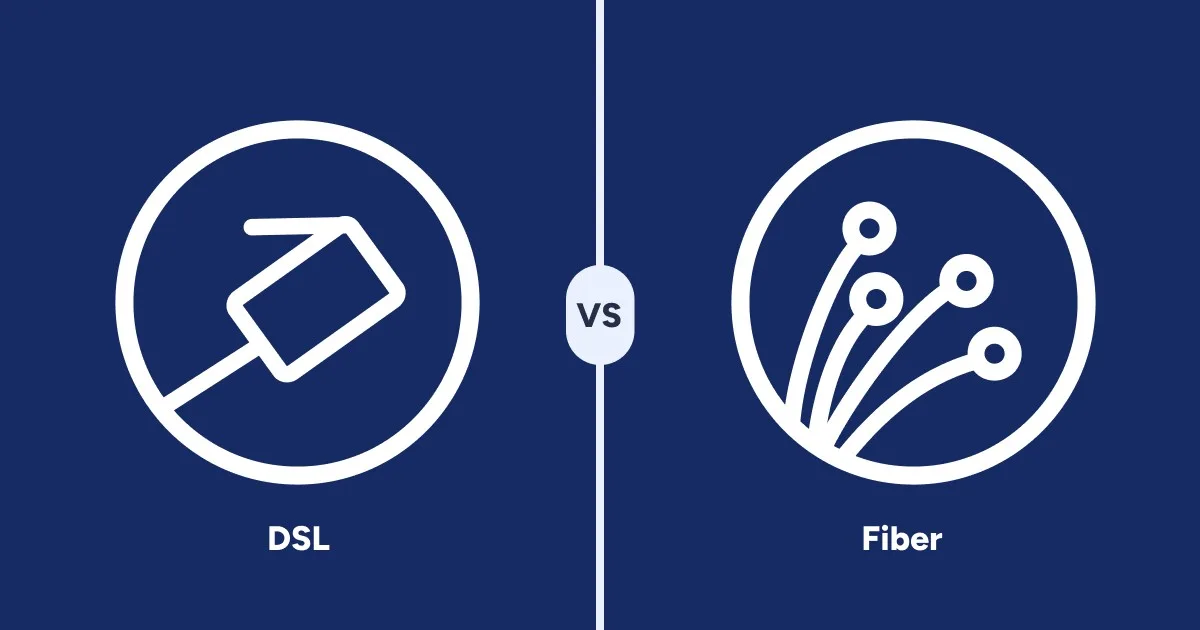How To Get Internet in a New Apartment
Should you choose a 5G home internet provider?
Feb 17, 2026 | Share
FAQ
You can get internet service in two main ways when you move into a new apartment: Go with your landlord’s recommendation or shop for your own provider. Each method comes with benefits and potential downsides.
We’ll get started with a step-by-step guide for finding an apartment internet service that’s right for you. Then, we’ll discuss the pros and cons of choosing a 5G home internet provider rather than the fully wired internet service your landlord might recommend.
In this guide:
Find providers | Determine speed needs | Research plans | Ask the neighbors | Choose a plan | Pros and cons of 5G home internet | Final thoughts
In this guide:
How to choose an internet provider for your new place
Choosing the best internet service for your new apartment comes down to what’s available, how much speed you need, and how much you can afford to spend every month. Let’s get into it.
Step 1: Get a list of available internet providers
Often, your landlord or property management company will give you information about a local internet provider when you sign your lease. Choosing that provider could be your easiest option, but it’s not always best in the long run.
Pro tip: Look beyond your landlord’s preferred provider
Many property managers will tell you about their preferred internet provider when you sign your lease or pick up your keys. Regardless of what they say, it’s highly likely that you have other options for internet service. That could mean faster speeds, lower costs, and better customer service.
We recommend exploring all your options for internet service before you decide.
The best way to find out which internet providers serve your area is to enter your zip code into a tool like the one below. You’ll get a list of providers that offer plans at your new place, plus links to their website.
Ready to start shopping?
Get a list of internet providers at your new address.
Most of the time, a fully wired cable internet provider such as Xfinity, Cox, or Spectrum will be on the list. If you’re lucky, you might also have fiber internet options like Google Fiber, Frontier, or CenturyLink. If you’re a little less lucky, DSL may be the only wired internet provider on the list.
Over the last few years, another internet type has become common: 5G home internet options (also known as fixed wireless internet) from providers including T-Mobile Home Internet, AT&T Air, and Verizon. These plans provide internet access over existing cell phone networks, but you will have your own Wi-Fi gateway and private Wi-Fi network.
Step 2: Determine how much internet speed you need
Next, figure out how much internet speed you need. Faster speeds mean more bandwidth, and that means you can connect more devices without worrying about slowdowns.
If you’re going to live alone in your new apartment, shop for speeds up to 100Mbps. That’s plenty for connecting your smartphone, laptop, and a TV at once. If you’re going to live with two or three people, shop for plans in the range of 250Mbps.
If you’re still not sure what internet speed you need, we have a tool that can help! Just answer six quick questions at the link below.
Step 3: Research internet plans from your list of providers
Once you know your speed requirements, you can enter your exact address into the website of each provider on your list. From there, you’ll get a list of service plans available at the new address.
The best plans have the following features:
- Top speeds of at least 100Mbps
- Free installation
- Free Wi-Fi equipment
Avoid internet plans with the following features:
- Top speeds less than 50Mbps
- Long-term contracts
- Price hikes after a short promotional period
Learn more about internet technology types and how to shop for internet service. If you are moving but like your old provider, learn what it takes to transfer your internet service.
Step 4: Talk to the neighbors
People who live in your building may be the best source of information about internet service at your new place. If you feel comfortable knocking on a few doors or sparking conversations in the mail room, ask your neighbors which providers they use. If that goes well, follow up with questions about how often they see outages and slowdowns, whether there are any hidden fees, and whether they’ve had to contact customer service.
Step 5: Make a decision and schedule installation (or do it yourself)
You’ve done your research, and it’s time to pick a plan. If you’re lucky, you can choose a plan with free self-installation. If that’s not an option, you’ll need to schedule an installation appointment with a service technician.
Either way, we recommend downloading your internet provider’s app on your smartphone during setup. Most of the time, that app is the easiest way to manage your account, control your Wi-Fi network, and get notified about outages and software updates.
Is 5G home internet a good idea for apartment dwellers?
National 5G providers like T-Mobile 5G Home Internet and Verizon are nice alternatives to the fully wired provider your landlord might recommend. T-Mobile has the biggest 5G network in the U.S., and its equipment did well in our real-world testing. Verizon and AT&T also offer 5G or 4G LTE home internet that might be available if your new place is an older neighborhood or a rural area.
The following plans get it right when it comes to price, speed, and quality of service. What’s available to you will depend on your exact location.
| Plan | Price | Speeds | Shop online |
|---|---|---|---|
| T-Mobile Rely Home Internet | $50/mo.* w/ AutoPay, plus taxes & fees. | Up to 318Mbps | View Plans for T-Mobile Home Internet |
| AT&T Internet Air | $60.00/mo.† | Up to 225Mbps | |
| Verizon 5G Home Internet | $50/mo.‡ | Up to 1,000Mbps | View Plans for Verizon Home Internet |
Data as of 02/17/2026. Lower prices may require bundling with mobile phone service. See disclaimers.
Benefits of 5G home internet
Internet service from 5G providers is easy to install. Just decide where to put your Wi-Fi gateway, plug it into a standard power outlet, log in on the mobile app on your phone, and follow the on-screen instructions to set up your network and devices. It should take about 15 minutes.
Freedom from contracts and the early termination fees they come with is another good reason to choose 5G home internet. If you don’t like the service for any reason, just let your provider know and return your equipment. It’s like it never happened.
Modern Wi-Fi gear is another big benefit of 5G home internet. With each of the top three providers, you get a free gateway that makes it easy to connect your phones, laptops, gaming consoles, and smart speakers. Then, you can control it all in a free mobile app.
Cons of 5G home internet
Fixed wireless internet uses the same technology cell phones use, so it’s subject to some of the same problems. If your apartment is far from the nearest 5G tower or if a lot of your neighbors are trying to get online at once, for example, you could see slower internet speeds. Unfortunately, 5G home internet service is deprioritized relative to mobile traffic on the same network.
Limited plan choice is something else to keep in mind with 5G internet providers. While some cable and fiber internet companies offer a wide range of plans, companies like T-Mobile and AT&T offer only one option for 5G home internet.
Crowded Wi-Fi channels can also be a problem with 5G home internet in apartments. You can usually get around this problem by connecting your high-bandwidth devices (such as a 4K TV or gaming console) directly to your gateway using an Ethernet cable. However, devices you can’t hardwire (like smartphones and laptops) may face signal interference.
Limited router choice is also a consideration. If you choose 5G home internet, your all-in-one gateway is included, and it functions as both a modem and router. If you’ve already invested in a router with all the bells and whistles, it may be wasted on a 5G home internet connection.
Other considerations
Before you decide on home internet for your apartment, It’s important to consider your current mobile phone provider. Every 5G home provider we review offers steep discounts for bundling your home internet plan with one of its mobile phone plans.
On the other hand, it’s possible to bundle mobile phone service with many cable and fiber internet providers, and it’s a good way to save money. Xfinity Mobile, for example, gives you two lines for just $30 each per month if you already have Xfinity internet. Spectrum gives you a free line of unlimited mobile phone service for a year if you already have Spectrum internet, and monthly prices after that first year are just $29.99 per line, if you have at least two lines.
Learn more about mobile and internet bundles.
Final thoughts
We love freedom of choice, and 5G home internet is an exciting new option for apartment dwellers. However, 5G doesn’t offer the same speed and reliability you might have with a cable or fiber internet plan.
Internet over the air isn’t always the best choice for internet in a new apartment, but we think it’s worth a try if you’re unhappy with your other options.
FAQ about apartment internet
How much should I pay for internet for an apartment?
What's the best internet service for apartments?
What's the easiest way to test and track your internet speed?
Is 5G internet good for apartments?
Disclaimers
*T-Mobile
Guarantee exclusions like taxes and fees apply.
†AT&T
$60/mo after $5 discount when enrolled in Autopay. Paperless billing req’d. Not available in NY. Monthly State Cost Recovery Charge in TX, OH, NV applies. . Service subj. to Internet Terms of Service at att.com/internet-terms. Offers may be modified, or discontinued, at any time without notice. Other conditions may apply to all offers. Speeds based on wired connection. Actual speeds may vary. For more info, go to www.att.com/speed101.
‡Verizon
w/ Auto Pay. Available in select areas. Consumer data usage is subject to the usage restrictions set forth in Verizon’s terms of service; visit: https://www.verizon.com/support/customer-agreement/ for more information about 5G Home and LTE Home Internet or https://www.verizon.com/about/terms-conditions/verizon-customer-agreement for Fios internet.
Author - Chili Palmer
Chili Palmer covers home tech services, with a special focus on understanding what families need and how they can stay connected on a budget. She handles internet access and affordability, breaking news, mobile services, and consumer trends. Chili’s work as a writer, reporter, and editor has appeared in publications including Telecompetitor, Utah Business, Idaho Business Review, Benton Institute for Broadband & Society, and Switchful.com.
Editor - Jessica Brooksby
Jessica loves bringing her passion for the written word and her love of tech into one space at HighSpeedInternet.com. She works with the team’s writers to revise strong, user-focused content so every reader can find the tech that works for them. Jessica has a bachelor’s degree in English from Utah Valley University and seven years of creative and editorial experience. Outside of work, she spends her time gaming, reading, painting, and buying an excessive amount of Legend of Zelda merchandise.




